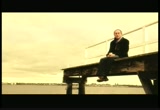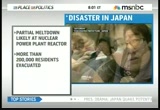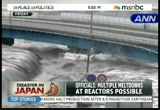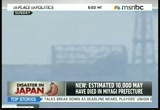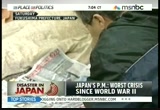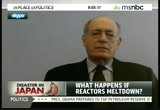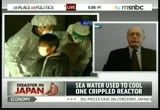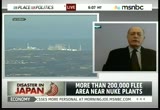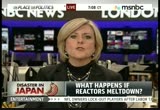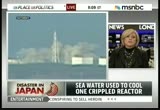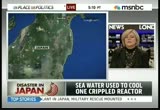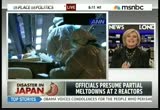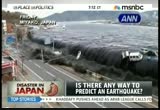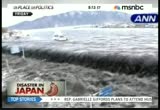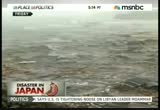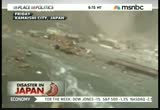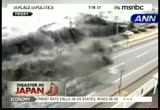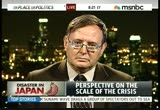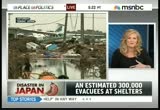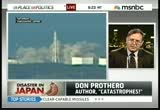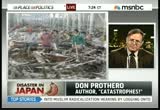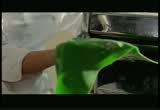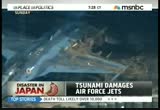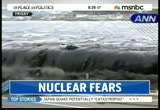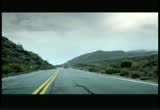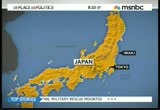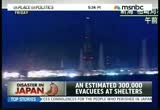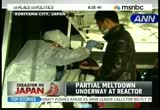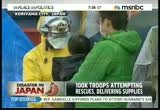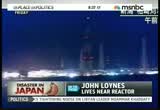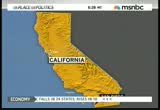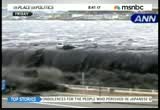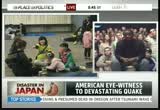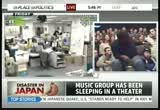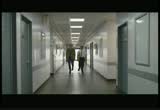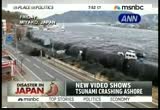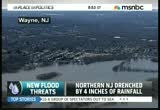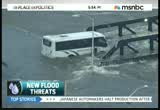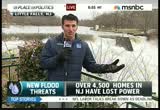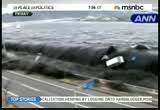tv MSNBC News Live MSNBC March 13, 2011 8:00am-9:00am EDT
8:00 am
over 20 years. i have busboys that are with me 30 years. when i tell them that i'm giving them a trip, they just can't believe it. giving back to my employees makes me feel great. and when my employees are happy, my customers are happy. how can the gold card help serve your business? booming is taking care of your business by taking care of your employees. alarming, new developments in japan today, new concerns about a meltdown at one of the damaged nuclear power plants and new numbers on how many people may have been exposed to radiation. and take a look at this. new, amateur video that came in just a short time ago. can you believe that? it is from the moment that the tsunami hit. these pictures are from miyako, japan, and in a moment we'll show you video from people who sat there and witnessed the
8:01 am
tsunami envelope their surroundings. it's hard to believe. good morning, everyone. i'm alex witt and this is "msnbc sunday." we have three big developments to tell you about this morning in japan. the government's top spokesperson says a partial meltdown is most likely under way at a nuclear power plant about 170 miles north of tokyo. three reactors at that plant lost their cooling functions in the aftermath of the massive earthquake and tsunami. meanwhile, more than 200,000 people have been forced to evacuate a 12-mile radius around those nuclear plants. japan's chief cabinet secretary says nine people have tested positive for high radiation levels on their skin and clothing. and new estimates on just how many people have died in this disaster. officials say at least 1,000 people were killed, but police are telling japanese media that as many as 10,000 people may have died in the hard-h hrkhardi prefecture alone. with a good morning to you, looking at those pictures from
8:02 am
behind you, what is the latest you're hearing on the nuclear plants? >> reporter: alex, this is a country that's facing three triple disasters, a quake, a tsunami, and now two damaged nuclear reactors. in terms of the meltdown question, the situation seems to be changing minute by minute. earlier today, we heard that there was a partial meltdown that was under way. a government spokesman has recently spoken and said that that is not the case, there is no meltdown. now, obviously, they're trying to play it down. they are, obviously, very concerned about whether or not there's any panic, people starting to panic and flee, and that's going to cause even more problems for them. what we do know is that, one, there was a problem yesterday, there was an explosion. unit three today is the big problem. the cooling function is not working and they're concerned that there is going to be an explosion there. let me tell you what the authorities are saying at the moment. they're saying that radioactivity is so small, it doesn't pose health threats. they're also saying they can't check it, but they are assuming it has a leak and they're trying
8:03 am
desperately to cool it down. radiation levels outside the plant rose above legal limits but have since declined. so, as you can see, their key concern is about reducing any panic there might be, alex. >> yeah. and in terms of just the damage numbers, are they throwing out figures yet in terms of what it will cost to try to rebuild? >> reporter: there was a figure batted about yesterday of about $5 million, but we don't know what that will be, because we're seeing the scale of the problem is literally unraveling day by day. we do know that there are a lot of people that have been killed, 1,000 so far is the main figure. some people today are saying up to 2,000. there are a lot of people missing. so, the situation is fluid. we don't know what is happening. 10,000 is a figure that was quoted today in just one particular region, and that was the first time an official came forward and said that 10,000 people may be dead in his particular region. there are also 100,000 troops now that are out there.
8:04 am
this is double the figure yesterday. yesterday it was 50,000, today it's 100,000. they're trying to tackle this as quickly as they can. and we do know that in evacuation centers, 215,000 people are being looked after there. they're trying to eat. there's very, very little food around. people say they're not eating very much beyond a little bit of noodles, a little bit of rice. we know that there are very few homes that have electricity. several million don't have electricity and water, and obviously, food is obviously a key concern. so, you know, there's very, very little good news, but i will tell you one tiny piece, a rare piece of good news. a 60-year-old man was found nine miles out to sea. he had been swept away and he was sitting, would you believe, alex, on the roof of his house. >> what a story. how long had he been there, then, since the tsunami? he was just found yesterday? >> reporter: absolutely, just found today, in fact. this is one tiny piece, rare piece of good news that's been released today by the government.
8:05 am
>> oh, that is an extraordinary piece of news. some story he's going to have to tell. i'm sure we'll hear it at some point. meantime from you, thank you very much, tazeen ahmed. we'll get more now on the news that partial meltdowns may have occurred at two nuclear reactors in japan, both crippled at two facilities further south and at another facility, three reactors are experiencing cooling problems. peter bradford teaches energy policy and law at vermont law school. good morning to you, peter. >> good morning. >> all right, what does this mean? we're hearing this word from japanese officials, partial meltdowns may have happened. how is that different from a complete meltdown? >> i assume that what they're saying -- a meltdown is not a technical term, so there isn't an agreed definition, but i think what's being said is that some of the fuel has been exposed to air, overheated, melted, and may or may not have
8:06 am
slumped to the bottom of the vessel, or it may still be in a disfigured core. but either way, some of the radiation has gotten out. but some of the fuel also has not melted, hence the word partial. >> you know, when we talk about a partial meltdown, though, are there any similarities to what happened in pennsylvania at three mile island? >> yes and no. the most dramatic difference, of course, is that during the three mile island accident, there was no earthquake, there was no tsunami. and as a result, the situation around the plant was very different. there was melted fuel. there was indeed a partial meltdown at that three mile island. there was a release of hydrogen, there was a hydrogen explosion, which was contained by the containment. >> okay. so, there's similarities and there are differences, but i'm curious, overall, you know what was shocking yesterday, peter, is that we were all able to see
8:07 am
the explosion at that nuclear power plant. and that sent itself just tremors amongst many of us, looking at it, you think this is a nuclear power plant and there's an explosion? we're about to show our viewers right there. you think, how can that happen? that cannot be good for the nuclear power industry overall. >> absolutely not. and that's a very significant difference from three mile island. at three mile island, for the first two days of the accident, no one appreciated the seriousness of what was happening, and it wasn't until months and years later that we knew the extent of the fuel failure. and you're absolutely right, the vision of a nuclear power plant blowing up, even if it is not an actual blowing up of the reactor containment, and it's certainly not a nuclear explosion, is not one that's good for the nuclear industry. >> yeah. >> as you know, they're hoping to build new reactors in the
8:08 am
u.s., and from that standpoint, what people are seeing on their screens, the release of radioactivity, the occurrence of events that are just not supposed to happen at nuclear power plants, is inevitably a substantial setback. >> yeah. all right, peter, we'll have a few more questions coming your way next hour, so stick around. thank you very much, peter bradford. meantime, nbc's anne thompson is in london with more on the potential nuclear crisis. anne, good morning. >> reporter: good morning, alex. this morning, for the first time, japanese officials are talking about possible meltdowns at two reactors at the fukushima one nuclear power plant. they say more radiation is leaking from that plant and they are trying desperately to prevent disaster. the primary concern today is the reactor in unit three, the cooling system in that unit was working and then it suddenly stopped yesterday. to relieve the pressure in the reactor, the utility company opened a valve to release some
8:09 am
radioactive vapor. that vapor goes into the containment building surrounding the reactor that vapor contains hydrogen, and the fear is, if there is another build-up of hydrogen, there will be a repeat of what happened yesterday at the reactor of unit one. that explosion blew off the roof and consumed the walls of the containment building surrounding unit one. officials say the reactor, which is enveloped in steel, was not damaged, but fear reverberated throughout japan. the government expanded the evacuation zone and began screening evacuees for radiation contamination. cabinet officials say nine people were treated for radiation exposure. to try and prevent a meltdown in unit one, authorities flooded that reactor with sea water, in effect, writing off any future use of the already 40-year-old reactor, apparently deciding it was better to lose the reactor that risk nuclear disaster if they tried to save it. alex? >> well, you know, i've got to say that makes sense, given the options, right? >> reporter: yeah. >> no, it does. but anne, so, you have the one
8:10 am
nuclear reactor that's been flooded with sea water. >> reporter: right. >> is it in all likelihood the kind of treatment that's going to have to go for the other one there and the other three that are, what, some six miles away? i mean, is that looking like what's going to happen? >> reporter: well, no. what they've done in unit three is they've released some pressure and they have been injecting water in it, and there is at this point, alex, no talk that i have heard of of flooding unit three with sea water as they did in unit one. i think what they're doing now is, obviously, watching it very carefully and watching very carefully for that repeat explosion, which is what they really fear at this point. >> yeah. and the fact that nine people were treated for high levels of radiation, do we have any idea, anne, were they people that were working in that plant or were they people in the community? and if it's the latter, what's the likelihood we're going to have more people being treated for radiation exposure? >> well, i believe, alex, most of them were people in the
8:11 am
community. i do know that at least one worker was exposed to five times the amount of radiation that what an international agency says a nuclear power plant worker should receive in a year. but i think, as you saw, they are obviously screening people for radiation. japan has notified the international atomic energy agency that it is preparing to distribute iodine pills to people who live in the evacuation area, all in an effort to prevent anybody from taking in any kind of radioactive material. so, they are doing what they can, but you know, apparently, there are some 140,000 people in the evacuation zone between the fukushima one and the fukushima two plant who have been evacuated. so, you're talking about a significant number of people who could be at risk for radiation contamination. >> okay. anne thompson covering things from london. anne, thank you so much. meantime, japanese officials
8:12 am
have now raised the magnitude of friday's earthquake to 9.0. that is still the strongest on record to ever hit japan. and the size and scope of the quake has raised a lot of questions about how much advance notice can be given before such a catastrophic event. for more, i'm joined live by thomas o'rourke, professor of civil and environmental engineering at cornell university. he is also on the advisory committee for earthquake hazard reduction. so, thomas, we're going to be showing -- thank you, by the way, for being here -- and as we speak -- >> good morning, alex. >> -- we're going to run the amateur video just in to nbc. this is remarkable. about three minutes of it, in fact, as the tsunami was striking. can you get a heads-up with regard to the earthquake that causes this tsunami? we hear reports of people in tokyo having been given as much as two minutes warning. any chance we're going to develop the ability to do it even further in advance of that? >> well, there's two issues. there is long-term warning and then there is short-term
8:13 am
warning. there is always the ability to have some short-term warning, because there are p waves and s waves. so, the primary waves would go out from the earthquake at a faster speed. in fact, they travel about twice as fast as the s waves, which create the great damage. and therefore, if you are at a distance away from where the epicenter of the earthquake is, you will get several seconds to maybe up to a minute warning because the p waves will be ahead of the s waves by that amount of time. in fact, some of the shinkansen trains, the bullet trains, are equipped with instrumentation that will allow them to pick up p waves, and they would have enough time, if the earthquake is far enough from where they are, to slow the train down and stop, come to a stable location, before the s waves, which create the great damage and the shaking, arrive to site. so, it depends on where you are. similarly, with the tsunami, the tsunami will generate a wave -- as we know, they travel at supersonic speeds at times, or
8:14 am
near, 500 miles an hour or so. so, if you are some distance and you know the wave's coming, you have that amount of time to be able to respond. >> yeah, with a tsunami, certainly that -- >> it will be very close. >> that will help with a tsunami, for certain. but i guess -- i'm looking at what we're talking about relative to japan, and everyone says that japan -- experts have been saying this, at least -- is the most well prepared, they are the most outfitted with the sensors everywhere. you're talking about that which they have on their high-speed trains to sense movement and shaking and the like. how about here in the states, thomas? how are we doing on that front here? >> well, you know, there's been an extraordinary sequence of events. if we put this in context, i think a year ago in january of 2010, we had an earthquake in haiti which killed 230,000 people. we had an earthquake in february of last year off the coast of chile, an 8.8-magnitude
8:15 am
earthquake. it's now rated as the sixth largest earthquake ever recorded after this earthquake now, which has been upgraded to a 9. we had two earthquakes in new zealand, one in september and one just recently in february, which destroyed christchurch. and now we have this major earthquake here. i think, alex, that we're talking about a new normal with respect to natural disasters. we need a fundamental rethinking as to what the risks are, what the exposures are. and then when we look at what's happening in the united states, we have modern systems. they're in some ways not as modern as in japan, because some of the new construction in japan is more -- it's newer and more -- constructed more recently than ours. but we have portions of our infrastructure which have been neglected, and we have portions of our infrastructure which are aging. and the grades of our infrastructure from the american society of civil engineers have been near failing in some
8:16 am
instances. so, we really have some challenges with respect to aging infrastructure. and the new normal with respect to natural disasters. i think that these sequence of major earthquakes, and particularly this earthquake in japan, has put everybody on notice that we have to prepare better and we have to do some fundamental rethinking about how well prepared we are, what kinds of engineering and other kinds of planning and preparation solutions that need to be put out there to reduce the risks that we're exposed to. >> i've got to tell you, thomas, i'm very glad that i'm sitting down listening to you, because i think you have been very articulate and honest about the way you feel and there are a lot of people thinking the same thing, a new normal, but this is really somewhat frightening. thomas o'rourke from cornell, thank you. we appreciate that. more on the incredible pictures we are seeing at the moment the tsunami hit the coast of japan. we're going to be playing these pictures all morning, because if you watch them and you see the amount of destruction from those
8:17 am
cars to the telephone poles, i mean, it's no wonder it's hard to get communication, and it's no wonder people were killed instantly as these waves hit. we're also going to show you some remarkable before and after aerial pictures of several japanese towns and the difference there absolutely stunning, here on "msnbc sunday." ♪ [ male announcer ] for the things you can't wash, freshen it with febreze. febreze eliminates odors and leaves a light, fresh scent. it's a breath of fresh air.
8:18 am
[ female announcer ] wake up to sweetness with honey nut cheerios cereal. kissed with real honey. and the 100% natural whole grain oats can help lower your cholesterol. you are so sweet to me. bee happy. bee healthy. ♪ are you having any joy? ♪ what you getting out of living? ♪ ♪ what good is what you've got ♪ if you're not having any joy? ♪
8:19 am
8:20 am
we are getting some incredible images. they're before and after images from japan. so, let's take a look right now at the city of sendai last april, and then what it looks like in a photo taken yesterday. streets packed with houses, not now. just mud. just a few houses remaining there. then as we take a look at the airport, moving on to that, this is what the airport looked like last august. we're going to see that in just a second there.
8:21 am
then -- okay, there's last august. then after the tsunami plows through the area, you've got some jetways still intact, but the vehicles, the planes, they've been completely washed away. "the new york times" posted these satellite images. they were taken by geo eye. japan's prime minister now says his country's facing its worst crisis since world war ii. between the earthquake, the tsunami waves that followed and an unfolding nuclear crisis under way, rescuers are jumping into action as they try to take in the true scale of this disaster. i'm joined live by don prefero, author of "catastrophes." good morning to you, don. thanks for joining us. >> good morning. >> so, we keep talking about how well prepared japan is for handling an earthquake disaster, and yet, when you look at what we're seeing here, it is almost incalculable damage, a death toll likely exceeding 10,000. is this just speaks to the nature of an event like this? as well prepared as you can be,
8:22 am
there are some things that we just can't fight. >> yeah, there's only so much you can do in a case like this. i mean, japanese have about the best building codes in the world, and they're very much focused on the earthquake safety. they drill year round. but if you're that close to an earthquake of that magnitude, no construction is able to withstand it. and as you saw from the video footage, there's no building on earth of a smaller size that can handle a wave the size of tsunamis, so -- >> exactly. so, then, my question is what can a community do to prepare for a tsunami? i mean when you hear one is coming -- or is there anything that, you know, months, years in advance you can do so that you're not left just throwing up your hands and running for your life? >> well, the tsunami's actually more survival, because in most cases, unless you're very close to its source, you have an opportunity to be warned and you can get to higher ground. the earthquake is the one you don't have much chance to escape from. >> okay. let's look at the nuclear angle of things, just to add on to this. the national atomic energy
8:23 am
agency ranks it on a scale of one to seven, seven being the worst. seven is ten times worse than a six. chernobyl is a seven. three mile island is a five. japanese officials are rating the unfolding in fukushima as a four. can you give us a little more perspective on this nuclear angle? >> well, the nuclear situation is something different. they have to decide for themselves how dangerous a situation is and whether they can handle it or not. all these things have been very scary. the difference being, of course, this nuclear situation is caused by natural disaster, which the other ones, of course, were by human error. >> okay. let's look here domestically. how well prepared are we to handle disasters of this magnitude? >> from what i understand, the u.s. has been trying as much as they can to prepare for things, but to a large extent, we are not as prepared as the japanese. we don't drill as frequently as they do. many parts of the country don't have seismic codes that are up to date. many parts of the country, even
8:24 am
if they do have seismic codes, it's very slow in terms of rebuilding structures and retrofitting structures, because we often put those on the back burner when we have budget crises and economic issues like we do right now. >> okay. how do you feel about things, basically? i mean, when you look at where we are here in the united states, if you could rate it on a scale of a one to a ten, don, how do you think we stand in terms of earthquake preparedness, potential tsunami preparedness? >> we're probably better off than many countries that don't have very many earthquakes, but maybe a six or a seven. the bigger issue is that we need to take this as a warning, particularly those of us who live in earthquake country, as i do here in los angeles, and take it very seriously and start taking steps to prepare our infrastructure, to drill more often, and especially, everybody in my part of the world where earthquakes happen quite frequently, should have earthquake dmikits in their gars and should be ready to be without food, water and a lot of other things for a significant
8:25 am
period of time after a big one. >> people listening to these images and to what you're saying, maybe they'll be more prepared. don prethora, thank you very much. hear from a man living with his children near a power plant preparing for a meltdown. how is he preparing? we'll talk to him at the bottom of the hour. yellowbook has always been crucial to your business, but now, to get it really cooking, you need a little website development. some transparent reporting, so you know it's working. online ads and 1-on-1 marketing consultation. yellowbook's got all that. yellowbook360 has a whole spectrum of tools. the perfect recipe for success. visit yellowbook360.com and go beyond yellow.
8:26 am
[ male announcer ] from jet engines that have fewer emissions, to new ways to charge electric cars, to renewable sources of clean energy, ecomagination from ge is advanced technology that's good for both the economy and the environment. ♪ it's technology that makes the world work. [ squawking ] ♪ maybe it's because their department store makeup is so expensive. simply ageless with olay regenerist serum costs less and it won't glob up in lines and wrinkles. you'll look amazing and happy too. simply ageless, from olay and easy breezy beautiful covergirl. so let's build them up strong, and give them our cheese. kraft singles. more kids get their calcium from us than any other american cheese. kraft singles. the american cheese.
8:28 am
a new look this morning at a japanese military base devastated by the tsunami. you can see air force fighter jets slammed into buildings there. this video was captured in the same area where police fear as many as 10,000 civilians were killed. authorities investigating a deadly tour bus crash on the outskirts of new yorcity are looking into whether or not its driver fell asleep at the wheel. 14 people died when the bus overturned near an off-ramp on the new england thruway and smashed into a sign post, which then tore right through the vehicle, ripping the roof off. both survivors and witnesses to saturday's crash say the driver was driving erratically before
8:29 am
that crash happened. those who tried to help victims in the wreck described that scene as horrifying. >> they said this is horrible. you want to take a look at this. many of them i believe they weren't even crying because, oh, my god, oh, my god, you're stepping away. >> police say the driver claims he lost control while swerving to avoid a tractor-trailer. that crash is being treated as a criminal matter, but no one has been charged. what is it like to be living near the nuclear reactor in the midst of a partial meltdown in japan? well, you're going to hear from a man who lives a mere 30 miles away from that nuclear plant, so stay with us here on "msnbc sunday." ♪ 100 ways to enjoy pringles. ♪ 100 crisps, 100 ways. ♪ everything pops with pringles.
8:30 am
8:32 am
inside the 2011 dodge journey is an 8.4-inch touch screen that lets you control the stereo volume, radio tuning, climate controls, turn-by-turn navigation, and bluetooth activation -- technology inside technology controlling more technology. welcome to the future. now lease the new 2011 dodge journey mainstreet for $299 a month for well-qualified lessees. welcome back, everyone. i'm alex witt and we continue to watch the developments in the disaster in japan. at least one damaged nuclear reactor in the northeast appears to be going through a partial meltdown. workers are trying to use sea water to keep temperatures from
8:33 am
getting too high. more than 170 people have been evacuated from that area as a precaution. and new before and after pictures taken from geo eye show what the earthquake and tsunami did to sendai. that is the area hardest hit by the massive earthquake. you can see what the area looked like last april and then what it looks like after friday's earthquake, tsunami, all of it. no more homes, no more buildings there right along the coast. and we are hearing this morning from a man who lives in i whack iwaki, japan. he joins us on the phone. good morning. >> how are you doing? >> the question's back at you, how are you doing? what's going on there and are you stuck inside? just tell me the circumstances. >> well, everyone's just watching the news and keeping an eye on what's happening and watching the developments as they come up. >> all right. and what are you being told? i mean, is it safe for you to go out and about? do you feel safe going out? >> yes.
8:34 am
apprehensive, for sure, but yeah, the news has set the evacuation zone as 20 kilometers around the first one, 10 kilometers around the second plant, and that's both a good distance away from where we are still. >> okay, but what is your major concern, john? >> just, as everyone's major fear, is that it goes into a major meltdown. as it looks, i mean, radiation levels have decreased since yesterday. those radiation levels were never that high to begin with, but it's just about what's going to happen from now on. so, the current situation's okay, and if it stays this way, it's fantastic, but what's going to happen from now on, you know? >> exactly. i understand you have young children, and i know as a mom, it's hard enough to keep them corralled inside. are you able to go out with them? is life normal for them or not at all? >> no, we've been keeping them inside as a precaution and just going out ourselves when we absolutely have to. but you know, this area down here's supposed to be okay, but
8:35 am
cabin fever's a big problem. >> yeah. do they understand what's happened? i'm certain you felt an earthquake, right? >> oh, yeah, the earthquake here was huge, and there's been aftershocks going on and on, but yeah, they've experienced earthquakes before but not with the whole reactor problem. that's a new game, of course. >> yeah, and are they seeing the news? i mean, what's the reaction? how do you explain to young kids what's going on? >> these days, all the action shows and stuff that are on tv, they get quite excited to see big waves and cars being thrown around and explosions and stuff, but yeah, i guess they're assuming it's just another show. >> yeah. john, at what point will you feel safe enough to go outside and resume life as normal? i mean, i know you'll get information from the news and the government, but is there sort of a threshold that you hold and you say, at this point i'm going to feel safe? >> just, you know, when the all clear has been declared and when water's running and stuff again.
8:36 am
we're lucky where we're living, but other parts of town where we work and things have no water. so, when that situation becomes a bit more normal, then yeah. and when it's officially said by the agency that run the plants, that will be the time to go back to things, i think. >> yeah. how about your neighbors? i mean, are you all talking together, gathering together and just kind of wondering what the hell happened? >> there's a good community, especially in the areas that have been badly hit. like i say, our town here is very lucky. there is no major damage at all. we still have running water and everything. but the other areas where people have had a lot of trouble, they're working together. there's one interesting point that someone made, what's happening, no one ever consider ad that would be a problem over here. >> yeah. >> be an issue. everyone's talking together. >> the looting and lack thereof,
8:37 am
that's really attributable to the order, the respect, really of the japanese culture, wouldn't you say? >> yes, yes, absolutely. it wouldn't really cross anyone's minds. >> so, in some ways, japan is a place that -- i mean, how to deal with a problem like this, they're better situated mentally and emotionally, would you say that? is that the case? they seem to be able to handle it in certain ways. >> very efficient, yeah, when they're dealing with things, and fortitude when it comes to looking after things, and you know, just dealing with what's in front of them without panicking and worrying unnecessarily about it. i think some of my in-laws are being exasperated by me being nervous and if we go, where are we going to go to? it makes no difference. >> i think they'll understand if you're concerned and what you've been through because what you've survived with your family is remarkable, a story you'll talk about the rest of your life.
8:38 am
john, best of luck to you and your family. >> thank you very much. well, speaking of that nuclear plant situation, japanese scientists vented nuclear vapor from one crippled reactor saturday, trying to relieve some of that pressure. david craft, director of the nuclear energy information services, spoke with nbc about radiation levels in the area. >> we're looking at broken docks, sunken boats. >> reporter: a tour of the santa cruz harbor showed just what the tsunami left behind -- >> you know, that's actually not david craft. we were hoping to hear from him, and again, he's from nuclear energy info services, and talk about what he was seeing with the background radiation, and guess what? we have it now, so here we go. >> one of the more alarming ones i heard was that the fence site measure of 1,015 mili seiverts an hour. that's the dosage a person would
8:39 am
receive. at that rate, it's a dose 760 times the average person's annual dose from natural background radiation. >> well, certainly, officials are continuing to screen residents for the high levels of radiation as they are evacuated. and there are cleanup efforts in california today after the quake triggered a tsunami, slamming the coastline. powerful surges ripped apart dozens of docks in crescent city. it's just south of oregon. officials believe at least eight boats have been sunk. another was sucked right out of the harbor. the financial toll is expected to top about $10 million. then, hundreds of miles away, southern california was also a target. in san diego, a massive barge was torn from its anchor. lifeguards say the most damage was caused early yesterday when a second big wave came through. then, in santa cruz, a dock with dozens of boats was ripped out during the surges. and as nbc's monte francis reports, it's especially tough for the families who call those boats home. >> we're looking at broken docks, sunken boats. >> reporter: a tour of the santa
8:40 am
cruz harbor showed just what the tsunami left behind, boats upside down, under water, and docks snapped in half or just gone. >> holy crap! >> reporter: just 24 hours earlier, as this youtube video shows, many watched in santa cruz as the surge of water overtook the harbor. >> oh, my god! >> reporter: as boat owners got their first glimpse of the damage, it was especially difficult for the harbor's 60 or so live-aboards, a term used for those who call their boats home and who now have to find somewhere else to live. >> i've got a motor home, i've got friends, i've got family, i've got, you know, i've got other places i can be. i've been in this community my whole life, so. >> reporter: boat owner scott summers has the nickname the mayor of you-dock. half of you-dock was swept away, as well as many of the boats housed there. >> we're housing many of the live-aboards at our house, right across the freeway. and you know, we consoled
8:41 am
everybody last night. they have crab feet, so we took the crab from our house, had a crab feed and tried to make the best of it. >> reporter: even with damage upwards of $17 million, given what's happened in japan, people here say they're counting their blessings. >> this is a pretty a-okay event in my opinion because there's no loss of life, there's nobody even hurt. so, it's pretty lucky. >> reporter: in santa cruz, monte francis for nbc news. witness to disaster. you're going to hear from a survivor of the japan earthquake about what he saw friday and what he is seeing now. that's coming your way next. [ male announcer ] opportunity
8:42 am
is a powerful force. set it in motion... and it goes out into the world like fuel for the economy. one opportunity leading to another... and another. we all have a hand in it. because opportunity can start anywhere, and go everywhere. let's keep it moving. ♪ let's keep it moving. ♪ i was diagnosed with copd. i could not take a deep breath i noticed i was having trouble. climbing the stairs, working in the garden, painting. my doctor suggested spiriva right then. announcer: spiriva is the only once-daily inhaled maintenance treatment for copd, which includes chronic bronchitis and emphysema. i love what it does. it opens up the airways. announcer: spiriva does not replace fast-acting inhalers for sudden symptoms.
8:43 am
stop taking spiriva and call your doctor right away if your breathing suddenly worsens, your throat or tongue swells, you get hives, have vision changes or eye pain, or have problems passing urine. tell your doctor if you have glaucoma, problems passing urine, or an enlarged prostate, as these may worsen with spiriva. also, discuss the medicines you take, even eye drops. side effects include dry mouth, constipation, and trouble passing urine. it makes me breathe easier. i can't do everything i used to do. but there's a lot i can do that i was struggling with. announcer: ask your doctor if once-daily spiriva is right for you. ♪ [ folk pop ] [ man ] ♪ if you got worries then you're like me ♪ ♪ don't worry now i won't hurt you ♪ ♪ and if you got worries then you're like me ♪ ♪ don't worry now i won't desert you ♪ ♪ [ continues ] [ announcer ] when it comes to the things you care about, leave nothing to chance. travelers. insurance for auto and home.
8:44 am
call or click now for an agent or quote. we have some new, up-close video here of that disturbing tsunami wave in this amateur footage. watch as the water churns. this is dozens of cars. look at the force there as well. it's all happening right below the balcony where that person was filming. joining me now is bruce sampson, an american who witnessed the
8:45 am
tremendous earthquake. bruce is the associate director for young americans, a music advocacy group that's currently on an outreach tour there in japan. and part of those kids are right there behind him. so, with a good morning to you and your friends there, the students, bruce, let's talk about where you were when the quake struck, because you guys were all together, right? >> absolutely. we had just arrived in narita, preparing to do a workshop at a theater here in narita, and we were just unloading our truck and setting up things in the theater when it struck. >> okay. was that theater secure? i mean, were there things dropping? was there anything that touched get out of the way for fear of having debris? >> we actually didn't wait that long. we saw the lighting fixtures swinging, and we could feel just how strong the shaking was, so we just knew to get out. >> yeah. and this wasn't the first time you'd felt some tremors, right? you had already been in the area for a while and you felt tremors earlier that week?
8:46 am
>> yes, just a few days earlier when we were at the university in fujisawa. we felt nothing, obviously, of that magnitude, but yeah, we felt some before. >> yeah. bruce, i'm wondering where are you from in the united states, and this group as well? i'm just curious if anybody has grown up in these earthquake-prone regions of the united states, the californias, the west coast, you know, up in alaska. i mean, has anyone experienced this kind of thing before in your group? >> well, we have one young lady from japan right here. this is shuka. she's a member of our group, born and raised here in japan. we have several from the west coast, california. >> yeah, and i bet, though, even with that living experience, they probably never experienced anything like this. how about the last couple of days now, what has that been like for you? >> well, we've been hold up here in the theater. they provided a room for us
8:47 am
here, so we just decided to stay put, and we've just been trying to make the best of it. we've been fortunate enough to have a great support system around us, some local families have been really great at provide blankets and food and drink and just really taking care of us. >> yeah. we're going to throw up a map so people get an idea of where you are there in narita and sort of the proximity to everything. i mean, you're there between sendai, which saw the most damage from the tsunami, and tokyo. can you give me a sense of that shake, rattle and roll feeling, though? because you didn't experience anything in terms of water from the tsunami, i'm presuming. it was just the earthquake there. i mean, how terrifying is that? >> it was a little unsettling, for sure. especially when you're in a theater and there are all this equipment hanging above you shaking. you know, it's definitely unsettling, to say the least. >> yeah, and bruce, i mean, you've got a lot of young people there behind you. and i'm sure you feel a sense of
8:48 am
responsibility for them and their secure and well-being. >> oh, sure, absolutely. but we have a fantastic team and a fantastic leadership team, including our company manager over here and our staging manager right here. but just a fantastic group. i couldn't ask for a better crew to be with during a crisis like this. >> so, what are your plans, then? are you going to continue with this tour or are you going to say, you know what, it's time to come on home? >> no, we have every intent to continue. in fact, we're planning on getting on a bus tomorrow morning, heading into downtown tokyo to begin an international workshop. >> that's pretty incredible. when are you -- ultimately, if you're able to stick with your plans, when are you able to come home to the u.s.? >> april 4th. >> okay. can i just ask if everybody has been able to reach out to their parents? have you had cell phone problems or anything like that? has everyone checked in with mom and dad, guys?
8:49 am
>> yeah. >> okay. you know what? that just made me smile. i haven't smiled a lot this hour, so thank you for that. i'm sure your parents are glad to see you as well. listen, guys, best of luck. bruce, well done taking care of everybody, and we're thinking of you. i'm sure your music will make a lot of people happy, though, particularly under these circumstances. thanks so much. >> thank you. the long wait in new jersey for the floodwaters to recede. we'll talk about that and what's happening stateside. ever wish vegetables didn't taste so vegetably?
8:50 am
well, v8 v-fusion juice gives you a full serving of vegetables, plus a full serving of fruit. but it just tastes like fruit. v8. what's your number? cones can dry out quickly. that's why there's the febreze set & refresh. 100% scented oils eliminates odors for 30 days. for freshness from start to finish. the small space odor solution that's a breath of fresh air. the febreze set & refresh. have put their faith in sun life financial. we should be a household name. and we will be. so you're suggesting that we change our name from florida, the sunshine state, to...? florida -- the sun life state. the posters will be so cool. sooner or later, you'll know our name. sun life financial.
8:52 am
brand new video into msnbc. it shows the tsunami crash ago shore in japan right as it happened. the waves here barrel through a narrow bay, and they sent the ships crashing on to highway overpasses. the surging water carried houses, cars, debris well inland. people were seen standing on the roof tops as the water squirrelled around their homes. we'll have live reports on japan at the top of the hour. s first, let's get to some other
8:53 am
news for you and also overseas in libya, muammar qadhafi's forces continue to reclaim territory from the rebels trying to oust the long-time leader. libyan state television is reporting pro-qadhafi forces have retain a key oil town in the eastern region of the country. this as the arab league asks the u.n. security council to impose a no fly zone to protect opposition forces. well, emergency new jersey residents are mopping up after a drenching rainstorm soaked the northern part of the state for the second time in a week. at least four inches of rain fell on several communities. the torrential downpours washed out dozens of homes. the weather chabl's eric fish ser live in little falls, emergency new jersey, with the very latest. good morning to you. i see why they call it little falls, and that it is waterfall right there is oh so churning, eric. >> yeah. not so little of a falls here, alex. this is what four inches of rain from the last storm, four inches from the previous storm earlier in the week and all that snow melt ends up looking like. local official here's say that
8:54 am
last year during the flooding over this dam they had eight million gallons of water per second coming down the river. the river level is almost identical for this time last year. we're looking at pretty much the same volume. all that churning fast-paced water is heading downstream from little falls and over towards patterson, new jersey, where they are looking at the threat for potential evacuations today and flooding there as well. >> it won't fall below major flood stage before tuesday morning. what that meebz is a lot of folks in the neighborhoods here in little falls, twhoent be able to go back home for at least another couple of days. >> where are these folks? are they with families? they're a bunch of shelters open, friends? how is that working? >> the local authorities say some people -- they didn't -- i
8:55 am
know i went to my holtz last night and pretty much everyone in there was a refugee from this some neighborhood here inning falls. >> what is the biggest concern when all the water recedeses? is it basically just clean-up? is it the mud, the drenched basements? what about things like wiring and electricity? you know, not being properly cared for when it's been exposed to the water like this? >> where is the box that says all of the above. i think everything you just said is going to be a problem. some people here that see the flooding every year say that every year they see tens of thousands of dollars worth of damage. they throw out all their drywaudrywau drywall, carpet, many have to get new appliances and many of them get money from fema when all is said and done. >> amazing pictures right there. thank you for the story. the weather channel's eric fisher on the case there in little falls, new jersey. wisconsin labor protesters say their next fight is at the polls. tens of thousands of protesters gathered in madison saturday. police estimated that crowd at about 85,000, others at 100,000. they went to focus on future
8:56 am
elections now that cuts to public worker union rights have become law. almost 80 people were forced to evacuate a new york hotel because many were complaining of feeling dizzy on saturday. and it turns out, police discovered a carbon monoxide leak in the hampton inn in west seneca. charlie sheen's taking his rants to the road. he's going to start "charlie sheen live: my violent torpedo of truth" at detroit's fox theater next month. tickets sold out in 30 minutes and the second show in chicago has also sold out. we'll have more on the incredible pictures we're seeing this morning from the devastating quake and tsunami in japan. a live report coming your way at the top of the hour. stay with us on "msnbc sunday."
8:57 am
8:58 am
for firmer skin in 5 days. pretty heavy lifting for such a lightweight. [ female announcer ] olay regenerist. for such a lightweight. having the right real estate agent on your side is more important than ever. at remax.com, you can find the experts you need, whether you're trying to sell of hoping to buy. nobody sells more real estate than re/max. visit remax.com today.
8:59 am
142 Views
IN COLLECTIONS
MSNBC Television Archive
Television Archive  Television Archive News Search Service
Television Archive News Search Service 
Uploaded by TV Archive on

 Live Music Archive
Live Music Archive Librivox Free Audio
Librivox Free Audio Metropolitan Museum
Metropolitan Museum Cleveland Museum of Art
Cleveland Museum of Art Internet Arcade
Internet Arcade Console Living Room
Console Living Room Books to Borrow
Books to Borrow Open Library
Open Library TV News
TV News Understanding 9/11
Understanding 9/11